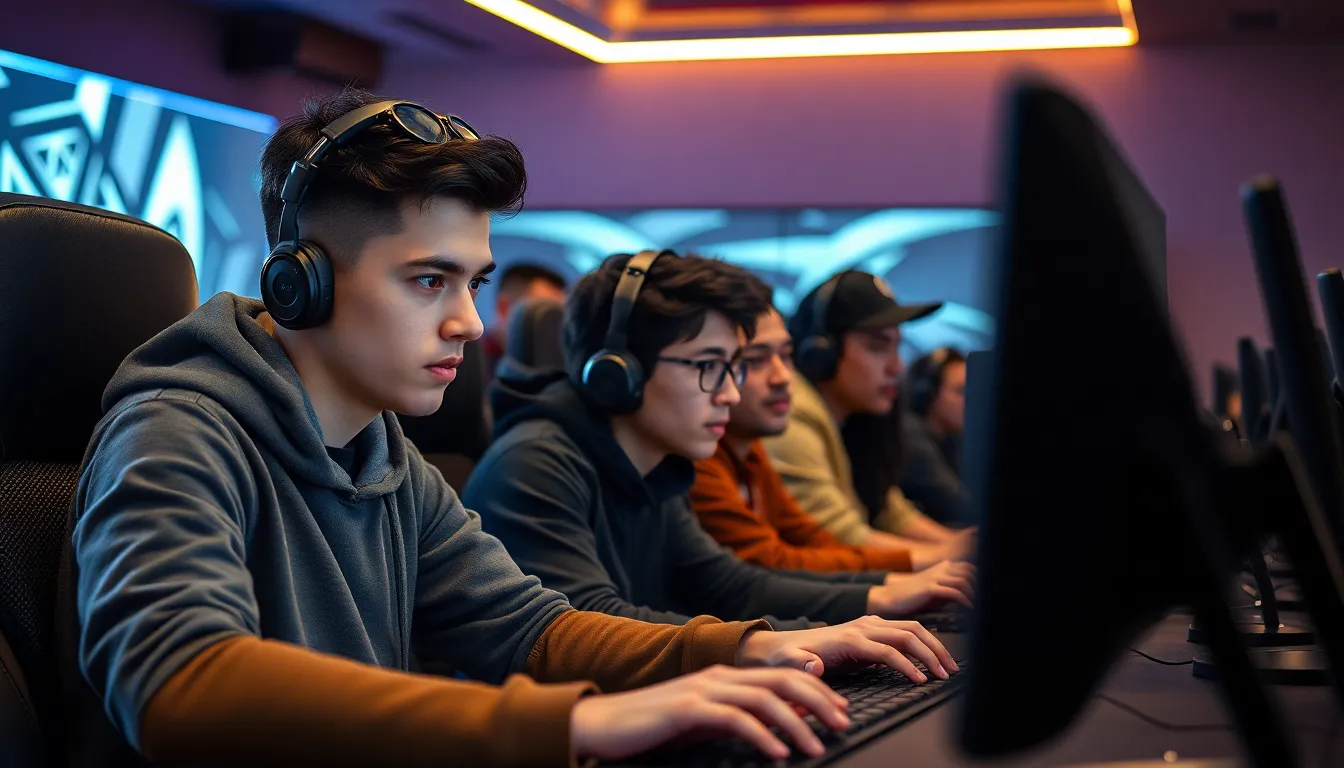In the fast-paced world of gaming, early game priority is the secret sauce that separates the victors from the vanquished. Imagine diving into a match, and instead of floundering around like a fish out of water, you’re grabbing the reins and steering your team toward victory. It’s not just about being the first to grab that shiny sword or snagging the best loot; it’s about setting the tone and establishing dominance right from the get-go.
Mastering early game priority can feel like finding the cheat code to success. It’s all about making smart decisions, capitalizing on opportunities, and, let’s be honest, showing your opponents who’s boss. Whether you’re a seasoned player or just starting out, understanding this critical phase can turn the tide in your favor. So buckle up and get ready to learn how to seize those precious early moments and transform them into a winning strategy.
Table of Contents
ToggleUnderstanding Early Game Priority
Early game priority refers to the ability to control key aspects of the game in its initial phase. Establishing dominance during this time influences both momentum and strategy. Securing essential resources, like jungle camps and objectives, remains crucial for gaining an advantage.
Players must focus on map control. Vision provides insights into enemy movements and possible threats. Acquiring wards in strategic locations can help track opponents and secure safer pathways for team members.
Rotations play a significant role in developing early game priority. Successful teams coordinate movements to take objectives or ambush opponents. Teamwork enhances effectiveness and establishes a stronger position.
Item acquisition also impacts early game success. Selecting the right items can create power spikes that allow champions to perform better in fights. Each item choice should align with the player’s role and the overall team strategy.
Furthermore, early game communication is vital. Sharing information about enemy positioning and cooldowns can assist teammates in making informed decisions. Coordination leads to improved execution of strategies.
Engaging in skirmishes allows teams to capitalize on early advantages. The outcomes of these encounters often dictate the pace of the game. Winning small fights can transition into bigger objectives like towers or dragons.
Lastly, understanding champions’ strengths and weaknesses is essential. Every champion has specific timings where they excel. Knowing these timings can aid in planning for successful trades and team fights.
Importance of Early Game Priority

Early game priority plays a crucial role in determining match outcomes. Establishing control early greatly influences strategic decisions and momentum.
Strategic Advantages
Dominating the early stages leads to significant strategic advantages. Gaining control over key resources enhances a team’s power level. Securing jungle camps results in increased gold and experience, granting a head start. Controlling vision allows players to track enemy movements effectively. Effective rotations can catch opponents off guard, enabling successful ambushes. Furthermore, coordination among teammates fosters a unified approach to objectives, allowing for swift takeovers. Item acquisition also contributes to power spikes, improving combat effectiveness in fights.
Impact on Overall Game Flow
Establishing early game control drives the overall flow of the match. Early advantages often dictate pacing, pushing opponents into a defensive stance. Teams that engage in skirmishes capitalize on their early gains, forcing enemies to play reactively. Successful trades can shift momentum, leading to a snowball effect that amplifies advantages. Communication about enemy cooldowns and positioning facilitates informed decision-making. By understanding their champions’ capabilities, players effectively plan encounters. Establishing early dominance frequently translates into control over mid and late-game objectives, setting the stage for victory.
Key Factors Influencing Early Game Priority
Early game priority hinges on several critical factors that can sway the course of a match. Understanding these elements helps players maximize their potential in the game’s initial phases.
Champion Matchups
Champion matchups significantly affect early game dynamics. Champions exhibit various strengths and weaknesses, influencing their effectiveness against opponents. Knowing how a champion interacts with others can dictate strategies. Players should leverage favorable matchups to assert dominance early. Additionally, executing well-coordinated strategies based on these interactions can create opportunities for kills or secure objectives. Valuable insights into champion abilities allow teams to adapt their gameplay, ultimately enhancing their early game performance.
Map Control
Establishing map control greatly aids early game success. Vision wards and scouting provide crucial information about enemy movements. Securing advantageous areas on the map helps teams predict enemy actions and set ambushes. Additionally, maintaining control in contested zones can limit the opposing team’s options. Utilizing vision effectively not only protects lanes but also assists in gathering resources. Teams that excel at map control force enemies into defensive positions, creating openings for objectives and favorable trades.
Resource Management
Effective resource management directly influences early game outcomes. Players should prioritize farming minions and securing jungle camps for gold and experience. Communicating with teammates about resource availability allows for coordinated attacks on key objectives. Prioritizing buffs and items that lead to power spikes can enhance overall team performance. Additionally, understanding when to use abilities and items conserves resources for critical moments. Teams that manage their resources effectively can achieve early advantages, setting the stage for continued success throughout the match.
Strategies to Secure Early Game Priority
Early game strategies significantly impact a team’s success. Prioritizing effective tactics can establish control and momentum during these critical matches.
Jungle Pathing Techniques
Optimizing jungle pathing ensures timely resource acquisition. Efficient routes promote quicker farming while minimizing exposure to enemy ganks. Players can prioritize large camps for more substantial experience gains impacting power levels. Timing the initiation of fights with a well-planned route often catches the opponents off guard. Understanding champion abilities can enhance pathing strategies, allowing players to anticipate potential encounters. Adapting routes based on enemy movements maintains an advantage throughout the early game. An organized jungle path can serve as a foundation for securing objectives and enabling effective rotations.
Vision Control
Establishing vision control creates a strategic edge in the early game. Placing wards in key locations allows teams to monitor enemy movements effectively. Utilizing vision helps teams avoid ambushes while enabling opportunities for counterplays. Regularly updating wards ensures valuable information about enemy positions and objectives. Communicating about sightlines fosters collective awareness among teammates, crucial for informed decision-making.
Prioritizing vision around objectives helps in planning strategies to secure them. Teams can establish vision dominance by coordinating ward placements and timely sweeps. Strong vision control enhances map awareness, guiding rotations and enabling smarter engagements.
Common Mistakes to Avoid
Players often overlook critical elements during the early game, leading to missed opportunities. Recognizing common mistakes enhances a team’s chance for success.
Overcommitting to Fights
Overcommitting to fights can quickly turn the tide against a team. Players should assess their champions’ current strength and the enemy’s capabilities before engaging. Understanding power spikes prevents reckless confrontations. When players dive too deep or chase too aggressively, they risk losing valuable resources like gold and experience. Maintaining a strategic retreat is essential to preserve these benefits. Effective communication within the team fosters awareness of everyone’s strengths, encouraging coordinated engagements rather than solo skirmishes. Balancing aggression with caution in fights ultimately secures early game advantages.
Neglecting Objectives
Neglecting objectives can lead to missed opportunities for significant advantages. Players must prioritize securing dragons, towers, and Rift heralds as key components in shaping the match. Focusing solely on kills distracts from strengthening the team’s overall position. Securing these objectives enhances map control and provides vital benefits. Keeping track of the timer for objectives informs when to regroup for their capture. Teams that effectively communicate their plans can coordinate approaches for securing these crucial targets. Prioritizing objectives solidifies early game advantages and sets up for sustained success throughout the match.
Early game priority is a crucial factor that can shape the outcome of any match. By focusing on map control and effective resource management players can create significant advantages that carry through to later stages. Understanding champion dynamics and utilizing effective communication enhances a team’s ability to secure objectives and capitalize on early opportunities.
Avoiding common pitfalls such as overcommitting to fights and neglecting key objectives is essential. Mastering these strategies not only boosts individual performance but also strengthens team cohesion. Ultimately establishing early game dominance sets the tone for the entire match and increases the likelihood of victory.




